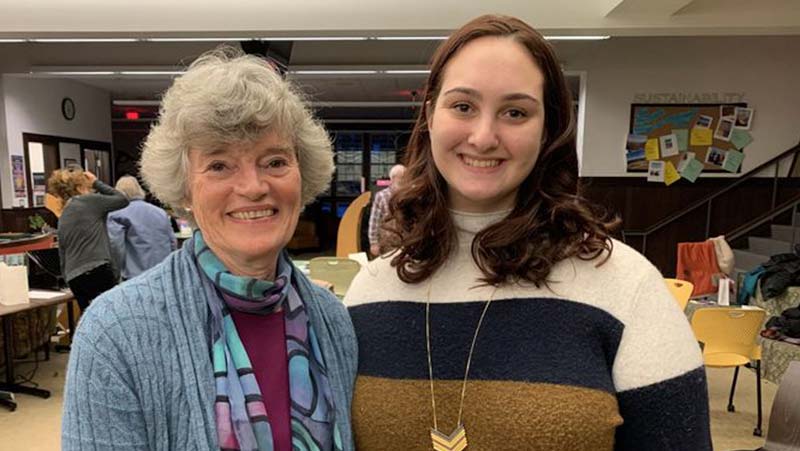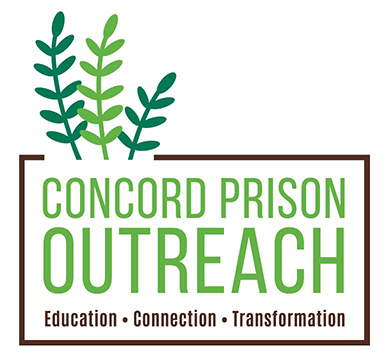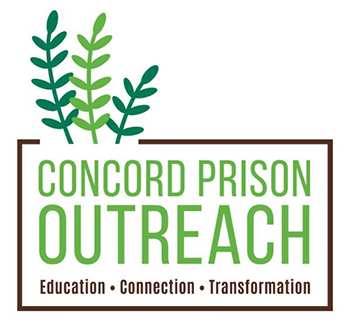Interview with Hannah Zack
On February 3, Jenn Albanese had the opportunity to interview Volunteer and Engagement Manager, Hannah Zack.
How did you first become involved with CPO?
When I was in college, I visited open prisons in Denmark and Germany. “Open” means people in prison can cook their own meals, wear their own clothes, and even leave during the day for school or work. I was struck by how beneficial the programming was in these prisons, and it made me think more about what prison education could look like in the United States. When I graduated college, I discovered that Concord Prison Outreach was looking to hire a volunteer coordinator, and that seemed like a perfect fit.
What are some of your favorite moments in your work with incarcerated students?
Being able to witness the transformation that happens, when you meet someone for the first time during week one, and then work together over many weeks, is a very special experience. Sometimes we hear that students have received positive paroles and that CPO programming was a piece of that. Some of these people have been incarcerated for thirty years – more years than I have lived – and their time at NECC is the final piece. It’s an honor to see them on their way out. Sometimes, you also get to witness older men interacting with younger, newly incarcerated men, who are trying to adjust. On a lighter note, Caroling Night is one of my favorite experiences!
What is special about teaching in a prison classroom?
Incarcerated students recognize that they are being offered an opportunity to learn, and know it is special. Volunteers sometimes remark on the difference between their incarcerated students and their classrooms on the outside – typical students don’t necessarily recognize education for the opportunity it is.

What is special about teaching in a prison classroom?
Incarcerated students recognize that they are being offered an opportunity to learn, and know it is special. Volunteers sometimes remark on the difference between their incarcerated students and their classrooms on the outside – typical students don’t necessarily recognize education for the opportunity it is.
What is the most important thing that prospective volunteers should know about being a CPO volunteer?
The process of becoming a volunteer inside prisons is long, and it should be. CPO needs to be sure that volunteers are equipped with the right tools. Also, CPO is responding to the needs articulated by directors of treatment, on behalf of the incarcerated men and women, and not creating opportunities based on the backgrounds and interests of our volunteers. We are “student first.” That being said, we value our volunteers tremendously; working with volunteers is the best part of my job. We believe that we are looking at program expansion when we can go back inside prisons, and we hope to match as many of our volunteers with opportunities as possible.
What are the biggest challenges for prison education in the next year? What are your greatest hopes?
COVID-19 restrictions on volunteering will be challenging for some time. The DOC is starting to look at technology, to increase distance learning options, which is important. But, my hope is that the value of human interaction will always be recognized. There’s this shared humanity, and the importance of being “seen.” A volunteer’s willingness to enter prison spaces, week after week, and to be present – this is as important as the instruction.
I’m looking forward to working on the many student-focused goals in the CPO strategic plan, to providing what’s wanted and what’s needed. I think we need to inform these goals with a greater awareness of what wrap-around services are available to newly released men and women. From a policy standpoint, anyone interested in prison education should be looking at what’s available at the community level.
How has working with CPO impacted your life?
I’m not sure I would have had the opportunity to teach in prison without CPO. Teaching in prison has taught me to see humans in a different way. I am very comfortable in meeting people where they are, on their own path. This may be a small shift in thinking but it affects my world view as well. My world view has also been impacted by a glimpse of how access to education sets up the trajectory of someone’s life.
Professionally, my position at CPO has allowed for a lot of flexibility and growth – opportunities to try new things and discover my strengths. Confidence and enjoyment in forming new relationships with people is probably my biggest area of growth since coming to CPO. Getting to know the CPO volunteers has impacted my life, for the better. My work at CPO might be the most unique thing I ever do

